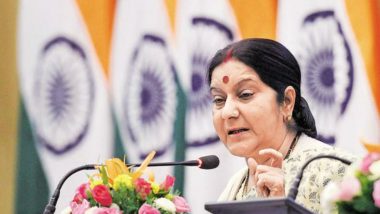Beijing, April 22 : China has agreed to resume sharing of hydrological data of the Brahmaputra and Sutlej rivers, External Affairs Minister Sushma Swaraj said here today, months after Beijing stopped the practice following the stand-off between Indian and Chinese troops at Dokalam.
The sharing of hydrological data is crucial to predict floods in India's northeast region, prone to natural calamities. Swaraj, who arrived here yesterday on a four-day visit to take part in the foreign ministers' meeting of the Shanghai Cooperation Organisation (SCO), met her Chinese counterpart Wang Yi and discussed a host of bilateral issues and ways to step-up the pace of high-level interactions to improve the relationship.
"We also discussed the importance of strengthening people to people contacts in bringing our two countries closer to each other.
"In this context, I conveyed our appreciation to the Chinese side for their confirmation on resumption of data sharing on Brahmaputra and Sutlej rivers in 2018 as this issue has direct relevance for people living in those areas," Swaraj said at a joint media event with Wang after their talks.
Last month, a team of officials of India's Ministry of Water Resources held talks with their Chinese counterparts on the cooperation of trans-border rivers at the Chinese city of Hangzhou, the first after Beijing last year stopped providing the data.
Under the existing bilateral Memorandums of Understanding, China provides to India hydrological information of the Brahmaputra river (Yarlong Zangbo) and the Sutlej river (Langqen Zangbo) during the flood seasons.
Under the arrangement, China provides flood season data of the Brahmaputra river between May 15 and October 15 every year.
Last year, China stopped sharing data soon after the 73-day long stand-off between Indian and Chinese troops at Dokalam over Chinese military's plans to build a road close to India's Chicken Neck corridor connecting North-Eastern states.













 Quickly
Quickly


